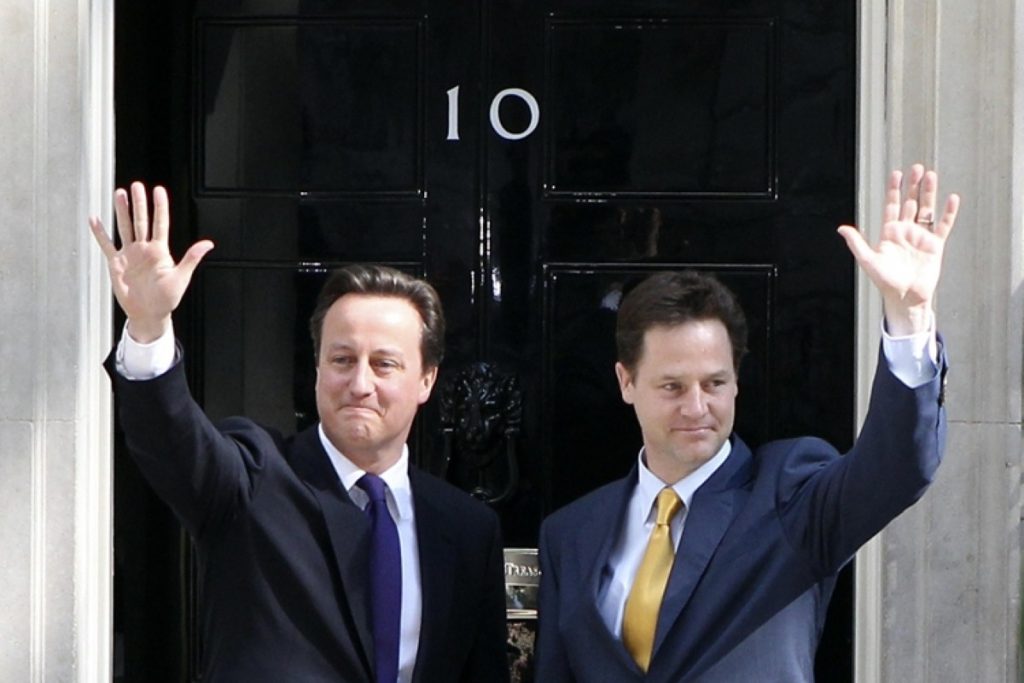Pressure point: Tuition fees provide first threat to coalition
By Ian Dunt
The first big test of the coalition’s ability to survive internal disagreement will arrive tomorrow with the publication of Lord Browne’s review into university funding.
The decision to reject a graduate tax means most Lib Dem MPs may abstain from a vote on the issue, leaving the Tories facing a coalition of Labour, smaller parties and Lib Dem rebels.
Over the weekend, Labour leader Ed Miliband made an explicit offer of cooperation to Lib Dem prepared to rebel over the issue.


All Lib Dem MPs signed a pledge at the election that they would not support an increase in fees, but that is precisely what Lord Browne is expected to announce.
In a sign that things were becoming chaotic, Lord Browne cancelled a second meeting with the National Union of Students (NUS) just hours before it was due to take place.
Analysts think he will suggest a raise in the cap to £7,000, effectively doubling the price of top-flight universities overnight.
Behind the scenes, the coalition is furiously trying to come up with a progressive element to the plan which would allow the Lib Dems to back it without selling out their student supporters – a key constituency for the party.
Initial reports suggested that might take the form of variable interest rates on the loans taken to pay for fees, with university students who go on to earn a high salary paying extra interest so that those who take up lower paid jobs have their interest rates subsidised.
But it now appears the government may instead scrap the low interest rates on student loans altogether, charging a standard rate and increasing the income benchmark at which students start paying back their loans.
As things stand, students start paying the money back once they earn £15,000 a year, but that figure would rise under the plans.
Neither option is likely to placate Lib Dem anger on the issue, and several senior figures in the party – including former leader Ming Campbell – have promised to rebel against any measure which increases tuition fees.
Vince Cable delivered a speech promoting the benefits of a graduate tax early in his stint as business secretary, winning the support of student groups.
The tax would only apply to graduates earning above a certain level. It is designed to make sure only those who benefit from university education have to pay from it, removing higher education funding from the general tax system.
Campaigners say that because the tax is only payable once graduates have benefitted from attending university, it prevents would-be students from low income households being put off by upfront payments.
But the business secretary made a firm U-turn this weekend when he wrote to Lib Dem and Tory MPs explaining why he no longer believed it to be a sensible option.
“While it is superficially attractive, an additional tax on graduates fails both the tests of fairness and deficit reduction,” Mr Cable wrote.
The tax would see some students pay more than the value of the course, some British students pay more than foreign students and do nothing to reduce the deficit, Mr Cable argued.
“As I have said on previous occasions, I am entirely committed to a progressive system of graduate contributions, the details of which we will be able to confirm shortly,” he wrote.
“And I have been open-minded about the possibility of a pure graduate tax. But it is clearly not the right vehicle. We can do better – and we will.”
But student groups seized on the letter as an act of betrayal from the Lib Dem leadership.
Aaron Porter, NUS president, said: “There is nothing fair about hiking fees and doubling student debt, whilst also increasing interest payments for those who have to borrow the most in order to fund their way through university.
“It would be an insult to the intelligence of those who voted for the Liberal Democrats to attempt to rebrand the regressive and deeply unpopular top-up fee system.”
The union is organising a mass rally in central London on November 10th to demonstrate against tuition fees.
Nick Clegg will have some serious thinking to do ahead of tomorrow’s review.
On the one hand, a decision to abstain from the vote, while consistent with the coalition agreement, would deliver the first sign of division in the coalition.
But if he decides not to abstain, he risks the party’s relationship with students, who have traditionally been the key to Lib Dem wins in university towns and cities.
With Mr Miliband proving popular with young people, Mr Clegg will be averse to alienating students just as Labour tries furiously to attract them to the opposition.









